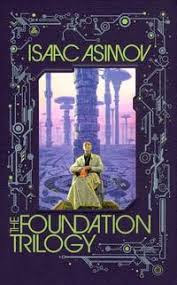Isaac Asimov's future history and Poul Anderson's Technic Civilization future history share two premises: hyperdrive and an interstellar empire (with an Emperor). They also have a structural similarity: the linking together of two originally independent futuristic series set in earlier and later periods.
I can suggest four ways to make Asimov's future history less implausible and/or more interesting. All four would make his history more like Anderson's.
(i) A much smaller empire.
(ii) An original rationale for the "hyperspace" cliche, like Anderson's multiple quantum jumps.
(iii) A multi-species galaxy. (This is more interesting but not more plausible.)
(iv) Not a predictive science of society but an evidence-based theory of historical cycles.
Although Anderson linked van Rijn and Flandry, he did not subordinate all subsequent volumes to the need to rationalize the linkage.
If you like Asimov, then read Anderson. If you have not read Anderson before, then you will be surprised.

5 comments:
Kaor, Paul!
I am not entirely sure I can agree with your point "iii." I find the idea of our galaxy having one intelligent race, ours, far more implausible than thinking there are many intelligent races in the galaxy. Never mind, for now, the untold billions of other galaxies!
I agree with your other numbered points, esp. number "iv."
I only wish more readers, even of SF, would give Anderson a chance, instead of sneeringly dismissing him was writing "1970's" science fiction.
Sean
Kaor, Sean!
As it happens, there’s an article in the June issue of COMMENTARY (a conservative magazine of politics and culture) making the case that Earth may be the only planet in the universe with life, and especially with intelligent life, even more especially with intelligent life having technology for interstellar communication. Maybe so, maybe not; at present, we simply don’t know, either way.
Best Regards,
Nicholas
I agree. We don't.
Fermi's 'paradox' asks the question, "If intelligent life is common, why wasn't the entire galaxy, including earth, settled by an alien intelligence long before humanity evolved, preventing that evolution?"
The easier interstellar travel is the rarer intelligent life has to be for earth not to have been settled long ago. FTL implies no more than one intelligent species per several galaxies.
So Asimov's human only galaxy is one of the more plausible parts of his fiction.
Kaor, Jim!
Maybe, maybe not. We simply don't know, either way, at present. But emotionally speaker I don't like the idea of our galaxy having only one intelligent species, ours. A galaxy with at least several intelligent races would be far more interesting!
But I really need to look up that June 2019 issue of COMMENTARY.
Ad astra! Sean
Post a Comment